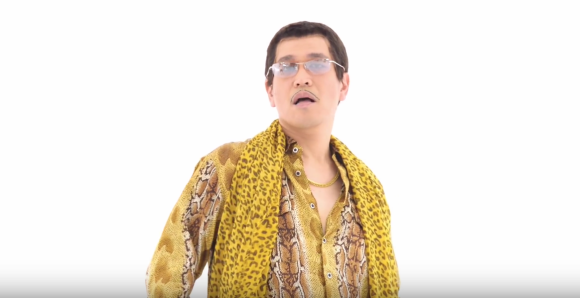
Piko Taro has a pen? Well some young Japanese office workers have a problem.
Since its release in late August, “Pen-Pineapple-Apple-Pen” has been showing up everywhere in Japan, including restaurants, the Foreign Correspondents’ Club, movie promotions, and even the local version of beloved children’s television program Sesame Street.
For the most part, aggravated backlashes against heavy-exposure pop culture trends don’t happen in Japan, where the prevailing attitude is to let fans enjoy what they like and simply not pay attention if it’s not your personal cup of tea. However, there’s one place where many young people Japanese don’t want “PPAP” encroaching into: their year-end work parties.
In Japan, it’s customary for coworkers, superiors and subordinates alike, to get together in late December for what’s called a bonenkai, which literally translates to a “forgetting the year party.” As the name implies, the goal is more to shrug off any lingering unpleasantness from the past 12 months than to earnestly reflect on them, and so most bonenkai aim for an atmosphere of lighthearted, often alcohol-fueled joviality.
Sometimes the festivities include having the participants to show off a talent or otherwise give some sort of entertaining performance, often in groups with other employees from a similar level of the organization. This year, some Japanese workers are now worrying that their bosses or senior coworkers will pressure them into singing the Piko Taro song at their bonenkai.
It’s not an entirely ludicrous prediction. “PPAP” has become a universally recognized pop culture phenomena that’s good for a quick chuckle among multiple age groups in Japan. It’s also less than a minute long, with incredibly easy to remember lyrics and dance steps, so it’s not like asking someone to learn them by the date of the party is a major imposition on their free time.
Nevertheless, enough people are dreading the possibility that the Japanese Internet has coined a phrase to describe the situation, mashing together “Piko Taro” and “harassment” to form pikohara, used to describe someone abusing a position of authority to coerce another into singing “Pen-Pineapple-Apple-Pen.”
It’s still to early to tell if pikohara will cement a position in the Japanese lexicon like precursors sekuhara (“sexual harassment”) and pawahara (“power harassment”) have. In the meantime, though, if you’re dealing with a possible pikohara crisis, it might be time to start thinking about countermeasures.
Source: Livedoor News via Otakomu
Top image: YouTube/公式ピコ太郎歌唱ビデオチャンネル -PIKOTARO OFFICIAL CHANNEL-
Follow Casey on Twitter, where if you ask him really nicely, maybe he’ll sing you a Bump of Chicken song.

 Pen-Pineapple-Apple-Pen singer to release 20-track album featuring brand-new songs
Pen-Pineapple-Apple-Pen singer to release 20-track album featuring brand-new songs Pen-Pineapple-Apple-Pen singer makes shocking claim about how much money the song has earned him
Pen-Pineapple-Apple-Pen singer makes shocking claim about how much money the song has earned him Pen-Pineapple-Apple-Pen singer accidentally gives epic stink eye to rival Japanese musician
Pen-Pineapple-Apple-Pen singer accidentally gives epic stink eye to rival Japanese musician Pen-Pineapple-Apple-Pen cafe set to open in Tokyo for a limited time!
Pen-Pineapple-Apple-Pen cafe set to open in Tokyo for a limited time! Tokyo’s Pen-Pineapple-Apple-Pen Cafe is now open, and we stopped by for a PPAP meal!
Tokyo’s Pen-Pineapple-Apple-Pen Cafe is now open, and we stopped by for a PPAP meal! Japan has only one airport named after a samurai, so let’s check out Kochi Ryoma【Photos】
Japan has only one airport named after a samurai, so let’s check out Kochi Ryoma【Photos】 7-Eleven Japan’s sakura sweets season is underway right now!
7-Eleven Japan’s sakura sweets season is underway right now! Survey finds that one in five high schoolers don’t know who music legend Masaharu Fukuyama is
Survey finds that one in five high schoolers don’t know who music legend Masaharu Fukuyama is Here’s where to find possibly Japan’s cheapest, most mysterious vending machine
Here’s where to find possibly Japan’s cheapest, most mysterious vending machine Family Mart’s Shibuya Cat Street shop hosts first-ever rescue cat photo exhibition for Cat Day
Family Mart’s Shibuya Cat Street shop hosts first-ever rescue cat photo exhibition for Cat Day Skyscraper sized Pokémon cards to appear in Tokyo all year long in Tocho projection mapping event
Skyscraper sized Pokémon cards to appear in Tokyo all year long in Tocho projection mapping event Ghost in the Sheel goes traditional with Japanese porcelain Tachikoma robots, only 50 to be made
Ghost in the Sheel goes traditional with Japanese porcelain Tachikoma robots, only 50 to be made This Tokyo apartment complex lets you paint your room, offers community BBQ and camping gear
This Tokyo apartment complex lets you paint your room, offers community BBQ and camping gear We mixed all 31 flavors of Baskin Robbins ice cream and created a Frankenstein dessert【Video】
We mixed all 31 flavors of Baskin Robbins ice cream and created a Frankenstein dessert【Video】 Princess Mononoke gets first-ever IMAX screenings to show off gorgeous new remaster【Video】
Princess Mononoke gets first-ever IMAX screenings to show off gorgeous new remaster【Video】 The 10 most annoying things foreign tourists do on Japanese trains, according to locals
The 10 most annoying things foreign tourists do on Japanese trains, according to locals Starbucks Japan releases new sakura goods and drinkware for cherry blossom season 2026
Starbucks Japan releases new sakura goods and drinkware for cherry blossom season 2026 Is Sapporio’s Snow Festival awesome enough to be worth visiting even if you hate the snow? [Pics]
Is Sapporio’s Snow Festival awesome enough to be worth visiting even if you hate the snow? [Pics] Japan has trams that say “sorry” while they ride around town…but why?
Japan has trams that say “sorry” while they ride around town…but why? Tokyo Skytree turns pink for the cherry blossom season
Tokyo Skytree turns pink for the cherry blossom season Highest Starbucks in Japan set to open this spring in the Tokyo sky
Highest Starbucks in Japan set to open this spring in the Tokyo sky Japan’s new “Cunte” contact lenses aren’t pronounced like you’re probably thinking they are
Japan’s new “Cunte” contact lenses aren’t pronounced like you’re probably thinking they are Shibuya Station’s Hachiko Gate and Yamanote Line stairway locations change next month
Shibuya Station’s Hachiko Gate and Yamanote Line stairway locations change next month Yakuzen ramen restaurant in Tokyo is very different to a yakuza ramen restaurant
Yakuzen ramen restaurant in Tokyo is very different to a yakuza ramen restaurant Starbucks Japan adds new sakura Frappuccino and cherry blossom drinks to the menu
Starbucks Japan adds new sakura Frappuccino and cherry blossom drinks to the menu Japan’s newest Shinkansen has no seats…or passengers [Video]
Japan’s newest Shinkansen has no seats…or passengers [Video] Foreigners accounting for over 80 percent of off-course skiers needing rescue in Japan’s Hokkaido
Foreigners accounting for over 80 percent of off-course skiers needing rescue in Japan’s Hokkaido Super-salty pizza sends six kids to the hospital in Japan, linguistics blamed
Super-salty pizza sends six kids to the hospital in Japan, linguistics blamed Starbucks Japan unveils new sakura Frappuccino for cherry blossom season 2026
Starbucks Japan unveils new sakura Frappuccino for cherry blossom season 2026 Foreign tourists in Japan will get free Shinkansen tickets to promote regional tourism
Foreign tourists in Japan will get free Shinkansen tickets to promote regional tourism Take a trip to Japan’s Dododo Land, the most irritating place on Earth
Take a trip to Japan’s Dododo Land, the most irritating place on Earth Naruto and Converse team up for new line of shinobi sneakers[Photos]
Naruto and Converse team up for new line of shinobi sneakers[Photos] Is China’s don’t-go-to-Japan warning affecting the lines at a popular Tokyo gyukatsu restaurant?
Is China’s don’t-go-to-Japan warning affecting the lines at a popular Tokyo gyukatsu restaurant? Survey asks foreign tourists what bothered them in Japan, more than half gave same answer
Survey asks foreign tourists what bothered them in Japan, more than half gave same answer Japan’s human washing machines will go on sale to general public, demos to be held in Tokyo
Japan’s human washing machines will go on sale to general public, demos to be held in Tokyo Starbucks Japan releases new drinkware and goods for Valentine’s Day
Starbucks Japan releases new drinkware and goods for Valentine’s Day We deeply regret going into this tunnel on our walk in the mountains of Japan
We deeply regret going into this tunnel on our walk in the mountains of Japan Studio Ghibli releases Kodama forest spirits from Princess Mononoke to light up your home
Studio Ghibli releases Kodama forest spirits from Princess Mononoke to light up your home Major Japanese hotel chain says reservations via overseas booking sites may not be valid
Major Japanese hotel chain says reservations via overseas booking sites may not be valid Put sesame oil in your coffee? Japanese maker says it’s the best way to start your day【Taste test】
Put sesame oil in your coffee? Japanese maker says it’s the best way to start your day【Taste test】 No more using real katana for tourism activities, Japan’s National Police Agency says
No more using real katana for tourism activities, Japan’s National Police Agency says Pen-Pineapple-Apple-Pen singer barks like a mad dog in music video for newest song【Video】
Pen-Pineapple-Apple-Pen singer barks like a mad dog in music video for newest song【Video】 Piko Taro performs new “Pen-Pineapple-Apple-Pen” extended version at Foreign Correspondents’ Club
Piko Taro performs new “Pen-Pineapple-Apple-Pen” extended version at Foreign Correspondents’ Club How to deal with Internet trolls, as taught by Pen-Pineapple-Apple-Pen’s singer
How to deal with Internet trolls, as taught by Pen-Pineapple-Apple-Pen’s singer Pen-Pineapple-Apple-Pen singer to dine with President Trump, Prime Minster Abe during state visit
Pen-Pineapple-Apple-Pen singer to dine with President Trump, Prime Minster Abe during state visit Kids react to Pen Pineapple Apple Pen music video 【Video】
Kids react to Pen Pineapple Apple Pen music video 【Video】 Ryuk from Death Note performs Pen-Pineapple-Apple-Pen in official release video
Ryuk from Death Note performs Pen-Pineapple-Apple-Pen in official release video Japanese singer wishes fans a Happy New Year with traditional version of Pen-Pineapple-Apple-Pen
Japanese singer wishes fans a Happy New Year with traditional version of Pen-Pineapple-Apple-Pen Pen-Pineapple-Apple-Pen creator Piko Taro to get the anime treatment
Pen-Pineapple-Apple-Pen creator Piko Taro to get the anime treatment Catchy tune “Pen-Pineapple-Apple-Pen” takes the world by storm
Catchy tune “Pen-Pineapple-Apple-Pen” takes the world by storm Piko Taro hams it up on the red carpet and has the time of his life at the Grammy Awards
Piko Taro hams it up on the red carpet and has the time of his life at the Grammy Awards Piko Taro to perform in legendary Budokan arena, sadly the musician who plays Piko Taro will not
Piko Taro to perform in legendary Budokan arena, sadly the musician who plays Piko Taro will not Donald Trump meets Pen-Pineapple-Apple-Pen singer Piko Taro in Japan
Donald Trump meets Pen-Pineapple-Apple-Pen singer Piko Taro in Japan Donald Trump’s granddaughter performs cover of Japan’s “Pen-Pineapple-Apple-Pen” 【Video】
Donald Trump’s granddaughter performs cover of Japan’s “Pen-Pineapple-Apple-Pen” 【Video】 Piko Taro reveals how much money he’s made from PPAP: as much as he did in the past 25 years
Piko Taro reveals how much money he’s made from PPAP: as much as he did in the past 25 years Yoshiki from X Japan teams up with Piko Taro for new “Forever PPAP” performance 【Pics & Video】
Yoshiki from X Japan teams up with Piko Taro for new “Forever PPAP” performance 【Pics & Video】